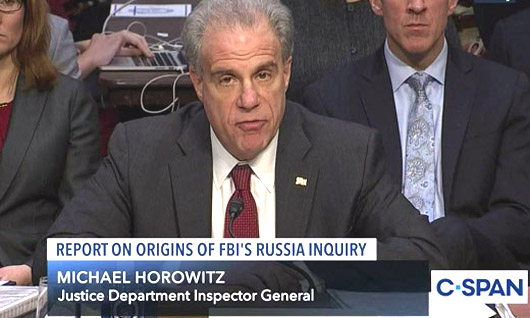by WorldTribune Staff, December 23, 2019
Department of Justice Inspector General Michael Horowitz’s recent report revealed that multiple FBI informants were spying on President Donald Trump’s 2016 campaign and that none of them came up with any kind of incriminating evidence.
The most publicized of those FBI informants was Stefan Halper, who targeted Trump campaign associates George Papadopoulos and Carter Page, while also attempting to engage with a senior Trump campaign official in New York, Horowitz’s Dec. 9 report said.
 But rather than hearing incriminating statements, Halper (whom Horowitz did not identify by name) recorded conversations that could be seen as exculpatory, the report said.
But rather than hearing incriminating statements, Halper (whom Horowitz did not identify by name) recorded conversations that could be seen as exculpatory, the report said.
Horowitz’s report said the FBI used several confidential human sources (CHS) against Trump associates.
Along with Page and Papadopoulos, Paul Manafort and retired Army Lt. Gen. Michael Flynn, were also targeted.
Attorney General William Barr said the FBI started the Trump-Russia “collusion” investigation on flimsy grounds. He has tapped John Durham, the U.S. attorney for Connecticut, to conduct an inquiry into the origins of the Russia investigation, known as Crossfire Hurricane.
“To lead to the conclusion that it showed knowledge of a later hack into the DNC [Democratic National Committee] was a pretty aggressive conclusion,” Barr told Fox News host Martha MacCallum last week.
“I just think that by the time the president entered office — around that time — [it was] becoming clear that there was no basis to these allegations not just the [Christopher Steele] dossier falling apart, but the information that they were relying on as to Page and to Papadopoulos.”
At one meeting with Papadopoulos, Halper reportedly pulled out his cellphone and placed it on a table.
“George, you and your campaign are involved in hacking and working with Russia, right?” Halper asked Papadopoulos.
The Horowitz report “supplies Papadopoulos‘ answer, perhaps recorded on that cellphone,” reporter Rowan Scarborough noted in a Dec. 20 report for The Washington Times. “WikiLeaks by then had released thousands of Democratic Party emails. U.S. intelligence said the emails were transferred from Russian military agents who did the hacking.”
Papadopoulos told Halper the “campaign, of course, [does not] advocate for this type of activity because at the end of the day it’s … illegal,” according to the IG report.
He also said “our campaign is not. … engag[ing] or reaching out to WikiLeaks or to the whoever it is to tell them please work with us, collaborate because we don’t, no one does that …”
Papadopoulos told Halper he knew “for a fact” the campaign had no role. Papadopoulos also said that “as far as I understand … no one’s collaborating, there’s been no collusion and it’s going to remain that way.”
Scarborough noted that the Crossfire Hurricane team, led by anti-Trump agent Peter Strzok, didn’t provide this information for inclusion to the Justice Department’s Office of Intelligence which drafted the FISA warrants on Page.
Horowitz listed that FBI decision as one of 17 glaring omissions or inaccuracies that misled the FISA judges who signed four surveillance warrants on Page.
“None of these inaccuracies and omissions were brought to the attention of OI before the last FISA application was filed in June 2017,” the IG said. “Consequently, these failures were repeated in all three renewal applications.”
As for Page, he had a discussion with Halper in August 2016 in which he unequivocally denied having ever met Manafort.
“This denial was relevant because the FBI included in its sworn affidavit allegations from a source — described by the IG as ‘Person 1,’ who was used by British former spy Christopher Steele to write his Democratic Party-financed dossier,” Scarborough noted.
Person 1 told Steele that Page and Manafort worked as a team to coordinate with the Kremlin in election interference.
This charge, like many in the dossier, proved untrue, according to the Mueller report.
Page also told Halper that he never met Igor Sechin and Igor Divyekin, two Kremlin operatives, as asserted by Steele.
That supposed meeting was key evidence used in the FISA wiretap allegation, which Horowitz called “central or essential” to the FBI gaining authority.
Horowitz questioned the entire basis for Crossfire Hurricane, saying the Page and Papadopoulos recorded statements “raised questions about the validity of allegations under investigation.”
Another CHS provided “general information” to the Crossfire team about Page and Manafort in August 2016. A senior agent told Horowitz that it was “not what we were looking for.”
That same agent did contact the handling agent for a different CHS who had worked on the campaign.
The agent told the IG the CHS might receive “a position somewhere in the administration,” which would be a “sensitive matter that we would need to handle differently.”
The handling agent later met with the CHS to ask about “insights” on the incoming administration.
The Crossfire Hurricane team sent an email to the handling agent asking that the informant conduct “passive listening.”
The email said:
“After careful consideration, the CROSSFIRE HURRICANE team has decided, at this time, it is best to utilize your CHS as a passive listening post regarding any observations [he/she] has of the campaign so far. Base[d] on current, on-going operations/developments in the CROSSFIRE HURRICANE investigation, we are not going to directly task or sensitize the CHS at this point in time. We appreciate [your] assistance in this matter and remain interested in any campaign related reporting that you guys may receive from the CHS during normal debriefs.”
Intelligence Brief __________ Replace The Media
